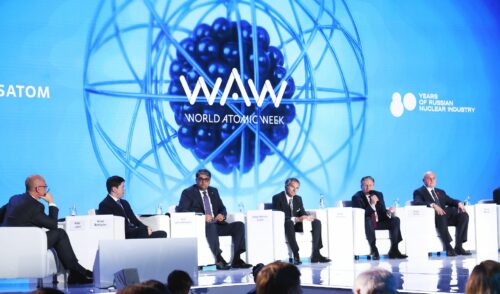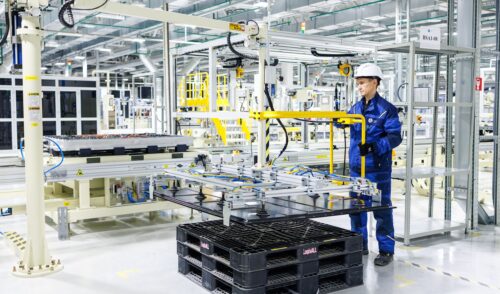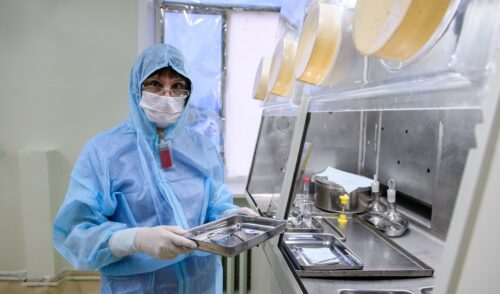
ITER has no competitors
back to contentsBigot has highly appreciated the role of Russian experts in the project implementation, having told that “Russia has proved itself as the most valuable, top-quality player”. He also added that works performed by the Russian experts deserve the top assessment. Upon completion of the round table Bernard Bigot thanked mass-media representatives for their contribution to project coverage, having noticed that the activity on informing the public about both achievements and difficulties on the way of its implementation are its integral component.
On the second day of visit Mr. Bigot shared with the Russian Agency ITER team his plans at the round table for his post as the General Director. In the introductory speech he noted: “I am excited about the future of thermonuclear power generation industry, this the why I accepted the offer to chair the project”. Mr. Bigot also underlined that it was very important to understand that all experts participating in the project implementation were “ITERnational”.
In late afternoon prior to departure to France Mr. Bigot held business meetings related to the project implementation with S.V. Kirienko, the General Director of State corporation Rosatom, I.V. Borovkov, the head of the Russian Federation delegation in ITER Council, and Mr. Jean-Maurice Ripert, the ambassador of France in Russia.
Press conference was held following the visit results, noting that ITER project has no competitors today. The question of journalists about chances of Lockheed Martin US company to create a compact thermonuclear reactor raised laughter in the hall.
“I heard about this as well and even make enquires,” Bernard Bigot, the High representative of ITER project in France took the floor. “I found out that the technologies that Americans planned to apply in the compact thermonuclear reactor, were investigated by various scientists for 45 years and were recognized unworkable”. In his opinion, it is impossible to produce an energy bulk using a small facility. We shall specify that it is planned to construct the international ITER with a height of a 10-storeyed house. “The most part of existing energy is thermonuclear energy, energy of the sun and stars. If we want to receive an economically sound thermonuclear energy, we must implement ITER project. We see no other way yet”, he continued.
INFORMATION
The international thermonuclear experimental reactor is being built in Kadarash research centre in the south of France together with the European Union, Russia, China, India, Japan, South Korea and the USA. «The project is designed for 35 years. It will be the first large-scale attempt to use thermonuclear reaction for electric power generation, which is a result of hydrogen nuclear fusion», — says Bigot. In his opinion, in case of success ITER will give to mankind an non-depletable energy source.
Last word rests with the director
Implementation of ITER project passes to the next stage this year. “The new phase of construction is manufacturing of various components by national agencies of participating countries and delivery of production to the site for assembly,” says Bigot. This work demands a number of organizational changes. Bernard Bigot suggests creating a new executive board of ITER project. It is planned that the General Director with assistants and heads of all seven national agencies will go into this board. The new General Director will receive powers to make any decision related to ITER project, both for Kadarash site and for all seven national agencies.
Participants of the press conference agreed that work would become more effectively and faster with the new management structure. “We spend one million euro a day for two thousand persons, who work on the project, therefore it is important to make timely and correct decisions. We have no right to squander money,” he continued.
Organizational changes will be related, first of all, to the European agency. “EU delays funds for manufacturing of the vacuum chamber, poloidal and toroidal coils, which are elements of the systems that define the project progress in general,” said Anatoly Krasilnikov. “More rigid control of the European agency will accelerate the project implementation”.
It is planned to develop the construction schedule of ITER international thermonuclear reactor before the end of 2015. “Finalization of the facility project and a good, reliable schedule are two most important problems of this year,” said Bernard Bigot. The final version of the baseline design, exact technical specification of all capital equipment will be ready before the end of this year. The scheduled plan of construction work will be developed according to it. “The schedule will specify control points that will allow assessing the work progress,” he brought to a conclusion.
Direct speech
Anatoly Krasilnikov, ITER Design Centre Director:
Participating countries from Europe contribute with 50% of the volume of ITER project financing. The share of Russia is approximately 10% from the total sum that we invest in the form of finished products. Financing of ITER project from the Russian Federation budget will be reduced ин 10% this year. Financing in the volume of 3.988 billion roubles was planned for 2015, and funds reduced by 400 million roubles less will be received after sequestering. We held a meeting to discuss the current situation with heads of enterprises and organizations participating in the project. We looked for solutions how to complete the amount of works planned for this year subject to cut back financing. Possible solutions include optimization of financial expenses and reduction of material procurement. We will set priorities: what systems may be manufactured later and what systems shall suffer no delay. Cut back financing will not affect the schedule and the amount of works in 2015. However, it may affect the future works under the project. 25 systems are being manufactured for ITER within the Russian Federation obligations. These are not experiments or R&D works; this is equipment that must be delivered to Kadarash according to the schedule.
Context
ChMZ successfully completed the works within ITER international project on superconductive strands, elements required to create superconductive cables. Last batch of production was shipped to France last year. Actually, the superconductive industry has revived in Russia. New orders will help the plant preserve the best competence and equipment. For example, ChMZ can participate in manufacturing of domestic medical tomographs. Besides, the issue of creating in the future a pilot production of other type of superconductors (high-temperature superconductors VTSP-2) is being discussed. The experimental pilot production of these materials will be first started in Kurchatovsky institute, and there are plans to establish manufacturing at ChMZ site.
Another option of ChMZ production development is the help to the European Nuclear Research Center (CERN). It is a question of the necessity to modernize electric magnetic systems used in particle accelerators. For this purpose CERN will need new superconductors, production of which ChMZ is ready to take on.


.jpg)


